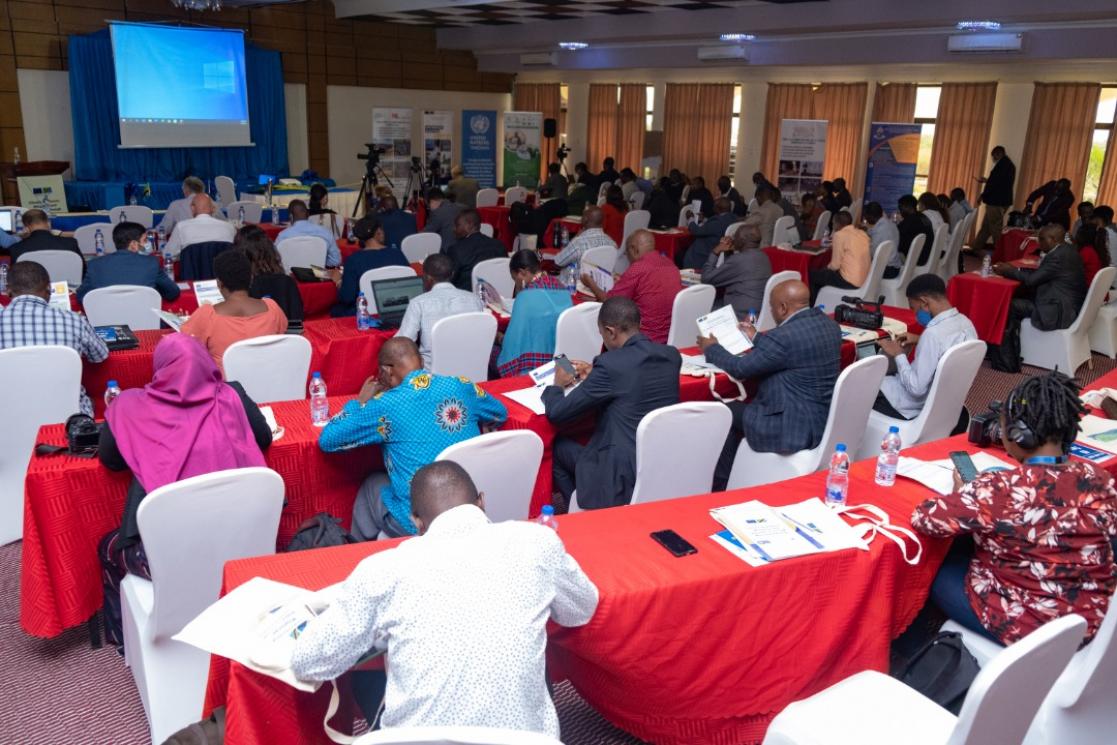The European Union and the Tanzanian Renewable Energy Association (TAREA) hold a seminar to foster renewable energy for climate resilience and to launch new EU funded energy programmes
Dodoma, 13 December 2021; The European Union and TAREA hosted a public-private stakeholders’ workshop on climate resilience mitigation and adaptation through renewable energy in Dodoma. The event brought together around 100 key stakeholders including government officials and policymakers from sector ministries and agencies, development partners, UNDP, UNIDO, UNCDF, private sector, Non-Government Organizations, research and academia, SMEs engaged in energy for cooking and media.
Participants also attended remotely, logged-on from around the globe to ask their questions to expert panels throughout the day.
Topics debated during the day included the role of the private sector in off-grid electrification under the current regulatory framework; productive use of energy in rural settings, business and small industries; and possible strategies to increase the productive use of electricity. Other topics included clean cooking whereby the panellists discussed how Tanzania can halve its usage of unsustainable biomass for cooking by 2030.Challenges and opportunities for large-scale grid-connected renewable energy producers were discussed.
“The European Union is committed to supporting renewable energy in Tanzania. Climate change and environmental degradation are an existential threat to the entire world. To overcome these challenges, we need to become innovative and work with partner countries like Tanzania under the European Green Deals and the Tanzania climate change policy to support the country’s transformation into a modern and resource-efficient economy,” said EU Ambassador Manfredo Fanti.
“Tanzania has huge potential to develop its renewable energy sector. The workshop today sets out how we can work together and move forward to achieve these goals,” said Matthew Matimbwi, Executive Secretary, TAREA.
The EU launched new energy programmes during the event. With a total EU contribution of EUR 30 million, the “Integrated approach for sustainable cooking solutions programme”, addresses both, the market for alternative cooking solutions, as well as the sustainable production of charcoal to reduce forest degradation. Part of this programme, the Cook Fund for accelerated market roll-out of clean cooking solutions, will be implemented by UNCDF and it has a budget of EUR 17 million. This new programme focuses on improved and alternative cooking technologies especially targeting urban areas as largest consumers of charcoal.
The conference also announced a new investment by the EU ElectriFI finance facility, in Simusolar. Simusolar is a private company and leader distributor of solar energy technologies in East Africa. The investment will be used to strengthen its operations in Tanzania where it provides high quality solar water pumps and fish lamps to farmers and fishermen.
Speaking during the event, the guest of honour, the Deputy Minister of Energy, Hon. Adv. Stephen Byabato, representing the Minister said that “My appeal to Small Power Projects (SSPs) is to consider deployment of efficient technologies and promote innovative energy efficiency practices so that your products are competitive and widely affordable by end-users. The Ministry of Energy will continue to engage stakeholders to discuss opportunities and challenges and forge ahead a road map to develop the Energy sector”, added the Deputy Minister.
These programmes falls under the EU Green Deal initiative and Tanzania’s climate change strategy 2021, which sets out to enhance renewable energy supplies in cooperation with the private sector.
Background:
Tanzania is extremely vulnerable to the impacts of climate change, with most of the rural population relying on rain-fed agriculture. This makes growing crops climate sensitive. Unpredictable rain fall does not make it easy for farmers to predict crops planting and growing seasons. Helping farmers to become more resilient by introducing drought-resistant seed varieties for example is critical to ensuring sustainable food and nutrition security in Tanzania. The EU promotes climate actions through a wide range of initiatives, from policy and institutional development by supporting Tanzania to review and finalize its Nationally Determined Contributions (commitments the Government of Tanzania is taking towards tackling climate change) to community-based projects such as the eco-village concept, which encourages the use of energy efficient cooking stoves, promoting innovative approaches in agriculture, livestock, water and natural resource management in selected villages, as well as rural electrification.

